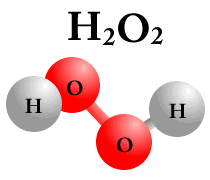Hydrogen Peroxide in water


Treating Drinking Water with Hydrogen Peroxide
Hydrogen peroxide (H₂O₂) is a powerful oxidizing agent that is gaining popularity as an alternative to chlorine for treating well water. When injected before the pressure tank, hydrogen peroxide can quickly kill bacteria, neutralize odors, and oxidize iron and manganese, common contaminants in well water.
One of the key benefits of hydrogen peroxide is that it decomposes into water and oxygen, leaving no chemical residues behind. This makes it a more natural and appealing solution for those concerned about the long-term health and environmental impacts of traditional water treatments, such as chlorine bleach.
How Hydrogen Peroxide Works in Drinking Water Treatment
When added to water, hydrogen peroxide releases dissolved oxygen, triggering an oxidizing effect that effectively targets:
- Iron and manganese: Oxidize dissolved metals into particulate form, making them easier to filter out.
- Iron and sulfur bacteria: Disrupts bacterial cell walls and biofilm, improving water clarity and smell.
- Hydrogen sulfide gas (H₂S): Commonly responsible for the “rotten egg” odor in well water, H₂S is neutralized during the oxidation process.
After oxidation, the resulting particles are typically removed through backwashing filters containing catalytic carbon or manganese dioxide media.
Safe Concentrations for Drinking Water Systems
While hydrogen peroxide is effective, only low concentrations should be used in systems designed for drinking water—typically around 7% hydrogen peroxide solution. This strength is strong enough for disinfection but safe for use in home injection systems. Higher concentrations (e.g., 35% or more) are intended for industrial use and should not be used in residential settings due to the risk of chemical burns, irritation, or other serious health issues.
Always follow the manufacturer’s guidelines for dilution and injection rates. Systems should include a contact tank to allow enough time for hydrogen peroxide to fully react with contaminants before water reaches your home’s taps.
Advantages Over Chlorine
- It does not produce harmful disinfection byproducts (such as trihalomethanes).
- It leaves behind no taste or odor.
- It is more effective at oxidizing iron, manganese, and sulfur bacteria.
- It supports a more eco-friendly water treatment process, breaking down into simple oxygen and water.
Chlorine, on the other hand, can leave behind residual salts and chemical odors and may require more frequent system maintenance.
Safety Considerations
Despite its benefits, hydrogen peroxide is a chemical that must be handled with care. Even diluted forms should be stored in a cool, dark place in properly labeled containers. Wear gloves and eye protection when handling, and keep the solution out of the reach of children and pets. Do not attempt to ingest or use it internally unless under medical supervision.
If you're switching from a chlorine injection system to hydrogen peroxide, most existing metering pumps can be cleaned and reused—but be sure to flush the system thoroughly to prevent unwanted chemical interactions.
Final Thoughts
Hydrogen peroxide offers a clean, effective, and residue-free method for improving the safety and quality of drinking water from private wells. By oxidizing iron, sulfur, and bacteria without introducing harmful by-products, it provides peace of mind for households looking to maintain healthy, great-tasting water.
Interested in switching your well water system to hydrogen peroxide? Contact our team or explore treatment system options tailored for peroxide use.
(Click here if you want to learn more about Hydrogen Peroxide in water.)
Resources:
To ensure accurate and safe information regarding the health effects of hydrogen peroxide, refer to the U.S. Agency for Toxic Substances and Disease Registry (ATSDR). They provide comprehensive details on exposure risks, health effects, and safety guidelines. CDC
Recent Posts
Water Quality for Horses and Livestock: A Guide to Healthier Barns and Pastures
Clean water is the cornerstone of animal health and productivity. Whether you're raising horses, cattle,…
Clean Drinking Water for Cats: What Every Cat Owner Should Know
Why Clean Drinking Water Matters for Cats Hydration is critical to a cat’s overall health,…
Pet Hydration: What to Know About Water Safety
Clean Drinking Water for Dogs: What Every Dog Owner Should Know Clean drinking water is…
How to Ensure Fresh, Safe Water for Your Birds: Daily Care Tips for Bird Owners
Why Filtered Water for Birds Is Essential for Their Health Like food, clean drinking water…
U.S. Water Problems by Region: Common Contaminants & Solutions
Curious about U.S. water problems by region? Water quality isn’t just a national issue—it’s a…
Wildfire Water Contamination: How to Ensure Safe Water After a Fire
Wildfire Water Contamination: What You Need to Know After the Fires Drinking water contamination is…



